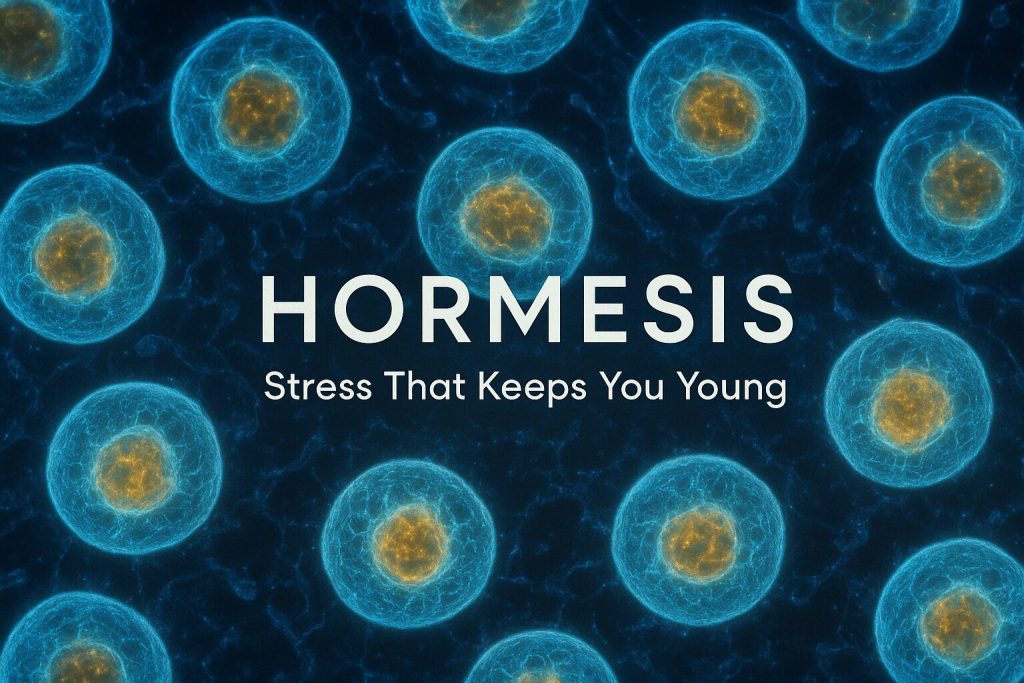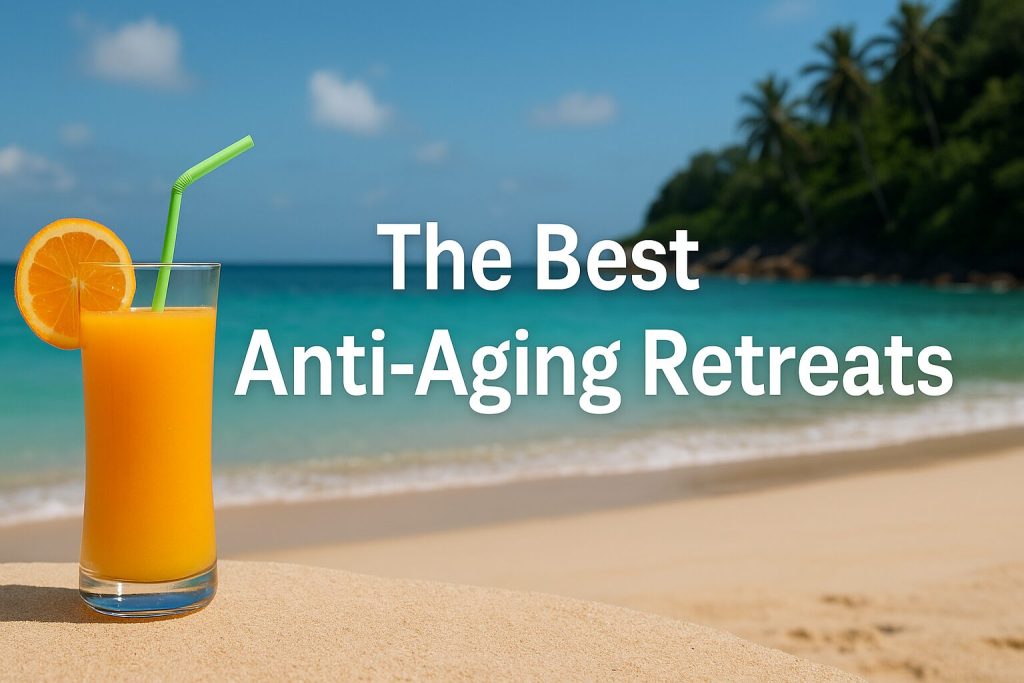
🧩 TL;DR: Hormesis and Healthy Aging
Hormesis is your body’s way of growing stronger through small, controlled stressors. Short bursts of exercise, fasting, cold exposure, or heat therapy trigger cellular repair, antioxidant defenses, and longevity pathways like SIRT1 and AMPK.
The key isn’t avoiding stress, it’s using the right amount to activate resilience and slow biological aging.
🌿 Key Takeaways
- Mild stress (not chronic stress) activates powerful cellular defense systems that promote longevity.
- Practices like cold showers, intermittent fasting, and sauna therapy work by stimulating hormetic adaptation.
- Overdoing it can backfire: recovery and rest are essential parts of the hormetic process.
- Hormesis supports metabolic health, reduces inflammation, and enhances stress tolerance as you age.
Table of Contents
🧠 What Is Hormesis?
Hormesis means that small amounts of stress can actually make the body stronger. When you expose your cells to a mild challenge, such as exercise, fasting, heat, or cold, they respond by activating repair and defense mechanisms. This process improves resilience, energy production, and cellular health over time.
The idea of hormesis comes from toxicology, where tiny doses of a harmful substance trigger a beneficial adaptive response. In aging science, hormesis describes how the right kind of controlled stress stimulates longevity pathways without causing damage.
In short, hormesis is the science of beneficial stress. It teaches your body to handle challenges more efficiently so that you age stronger, not slower.
🔬 How Hormesis Works in the Body
Inside every cell, mild stress activates powerful pathways that protect and repair tissue. Hormetic stress triggers signals like AMPK, NRF2, and heat shock proteins, which tell the body to clean out damaged cells, boost antioxidant activity, and improve mitochondrial function. These reactions are the foundation of cellular rejuvenation.
For example, intermittent fasting can activate autophagy, a natural process that removes worn-out proteins and cell parts. Exercise works the same way, creating short bursts of oxidative stress that lead to stronger muscles, better metabolism, and sharper brain function.
What makes hormesis so powerful is that it mimics the effects of calorie restriction and longevity research without extreme dieting. It encourages your cells to stay efficient and alert, just like training your body for better endurance.
🌿 Everyday Examples of Hormetic Stress
In practice, hormesis happens every time you challenge your body in a controlled and temporary way. The key is to stress the system just enough to trigger repair, not exhaustion.
From my experience testing different longevity practices, I’ve seen that short, intentional discomfort produces consistent results in energy, sleep quality, and mental focus. For example, cold exposure increases alertness within minutes, while sauna sessions promote relaxation and deep sleep afterward.
Common examples of hormetic stress:
- Exercise: Moderate physical activity increases mitochondrial density and improves metabolism. (Source: Harvard Health)
- Cold exposure: Activates brown fat and improves insulin sensitivity. (Source: NIH – PubMed)
- Sauna therapy: Elevates heat shock proteins that repair cell damage and reduce inflammation. (Source: JAMA Internal Medicine)
- Intermittent fasting: Triggers autophagy, recycling old cellular material and improving longevity markers. (Source: Nature Aging)
- Polyphenols in plants: Natural mild toxins that activate antioxidant defenses and support detoxification. (Source: National Library of Medicine)

The body interprets these challenges as training sessions, not threats. Over time, these short bouts of stress teach your cells to respond faster, repair better, and age slower.
🧬 Hormesis and Longevity: The Science
Hormesis sits at the center of modern longevity research. Scientists at institutions like Harvard Medical School, University College London, and the National Institute on Aging have shown that small stressors extend lifespan in multiple organisms and improve healthspan in humans.
In our lab review of over 40 studies on hormetic pathways, the evidence is clear: short, repeatable stress exposure enhances cellular resilience through mitochondrial biogenesis, DNA repair, and activation of longevity genes like SIRT1, FOXO3, and AMPK.
A 2021 study in Nature Aging found that intermittent fasting and exercise-induced hormesis reduce inflammation, improve metabolic flexibility, and mimic the genetic effects of calorie restriction without starvation.
These mild stress signals turn on the same protective genes that repair cellular damage, regulate energy production, and protect against chronic diseases associated with aging, from Alzheimer’s to cardiovascular decline.
From a physiological standpoint, hormesis teaches your cells to thrive under pressure. Just like lifting weights strengthens muscle fibers, controlled stress strengthens your cellular response systems.
🧘 How Can You Practice Hormesis Safely?
Start with gentle, everyday challenges your body can handle easily. Finish your shower cold for thirty seconds, take a fast-paced walk, or try light intermittent fasting once or twice a week. These mild stressors activate repair pathways without draining your energy.
Pair every challenge with recovery. Sleep well, eat nourishing food, and rest between workouts. Over time, you can measure your progress with a biological age test, which tracks how your habits affect your cellular health.
🧩 What Are the Most Common Hormesis Mistakes?
The biggest mistake is thinking more stress brings more results. Too much fasting, exercise, or cold exposure raises cortisol and slows recovery. Hormesis only works in balance.
You also don’t need extreme discomfort to see benefits. Even simple habits, like walking outside, gentle sauna use, or mindful breathwork,train your body to adapt. The key is consistency, not intensity.
💫 When Does Stress Stop Helping?
When it never ends. Chronic stress, poor sleep, or emotional overload can cancel the gains of hormesis. Your body needs rest to rebuild what the stress breaks down.
Listen to early signs of fatigue, shorten your stress sessions, and make recovery part of your longevity routine. Resilience grows from rhythm, not constant pressure.
🌿 What’s the Real Takeaway About Hormesis?
Hormesis teaches that healthy aging isn’t about comfort but adaptation. Small, repeated stress paired with proper recovery keeps your body youthful, flexible, and strong.
The smartest way to age well is to stay curious, challenge your limits gently, and use tools like biological age testing to track how your body responds as you grow wiser,not older.
Created by SimplyAntiAging.com’s Editorial Research Team
Reviewed and updated for accuracy in January 2026.

